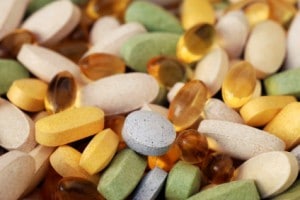 Slow down the aging process by consuming foods chock-full of anti aging vitamins (sometimes spelled anti ageing). Vitamins facilitate metabolic processes and protect us from the effects of inflammation and free radicals, which accelerate the aging process.
Slow down the aging process by consuming foods chock-full of anti aging vitamins (sometimes spelled anti ageing). Vitamins facilitate metabolic processes and protect us from the effects of inflammation and free radicals, which accelerate the aging process.
Why We Age
Free radicals and inflammation accelerate the aging process. There are many causes for inflammation and free radical production, but the result is cellular and tissue damage usually followed by incomplete or inadequate repair. See “Aging Process“. Free radicals and inflammation can be blocked by the following anti aging vitamins.
The Major Anti Aging Vitamins?
The major vitamins include vitamin A, the B complex vitamins, and vitamins C, D, E, and K. One vitamin is not necessarily more important than others. These vitamins are found in a variety of fruits and vegetables (vitamin B12 is an exception). Therefore, sound nutrition is the foundation of an anti-aging plan.
Vitamin A
Vitamin A boosts immunity enabling us to better fight infections and reduce our risks of cancers. It does this by enhancing T-cell function, a major component of our immune system.
B complex Vitamins
There are several B vitamins. Vitamins B1 and B2 facilitate the metabolism of carbohydrates into energy. Death occurs when energy production stops. Both vitamins also protect our nervous system. Vitamin B3 also called niacin plays a role in energy production, and also in the production of our sex hormones. It also can lower LDL cholesterol and triglycerides, and raise the HDL or good cholesterol.
Vitamin B5 or pantothenic acid has been touted as an aid in weight loss. Vitamin B6 protects the nervous system and is vital in the formation of hemoglobin along with vitamin B12 and folic acid. It has a role in the metabolism of fats, proteins, and carbohydrates, too.
Vitamin B12 along with B6 and folic acid reduce homocysteine levels. Elevated homocysteine is a risk factor for heart disease, strokes, and blood clots. B12 is also important in the production of red and white blood cells and platelets. Unlike the other vitamins, B12 is not found in plants, but in beef, pork, dairy products, fish, and organ meats.
Vitamin C
Vitamin C is a potent antioxidant that neutralizes the damaging effects of free radicals. It stimulates tissue repair and maintains collagen formation. It prevents LDL, or bad cholesterol from being oxidized, and in some studies has been shown to reduce LDL cholesterol levels by 5% and also increase HDL or good cholesterol levels.
Vitamin D
Vitamin D is in the news a lot these days as we learn more and more about this vitamin. Vitamin D is a hormone that participates in hundreds of biochemical and metabolic processes. It improves calcium absorption important for bone health. It inhibits inflammation and preserves telomere length. The shortening of telomeres accelerates the aging process. Individuals with optimal vitamin D levels show lower rates of cancer, as vitamin D enhances our immune systems. Low levels of vitamin D may play a role in developing diabetes.
Vitamin E
Vitamin E is another strong antioxidant found in soybean oil, wheat germ oil, safflower oil, peanuts, grain, leafy and cruciferous vegetables. Reduced vitamin E levels are associated with reduced physical function. It may protect the brain and boost the immune system.
Vitamin K
Vitamin K is important for blood clotting in response to injury. Vitamin K helps keep calcium in the bone and prevents calcium build-up in our blood vessels. Individuals on a blood thinner like Coumadin should speak to their physician before taking vitamin K.
As you can see there are many anti aging vitamins. Try to obtain these anti aging vitamins in your diet first, but supplements of anti aging vitamins are helpful.
See related articles “Anti Aging Supplements” and ” Weight Loss Supplements“.
